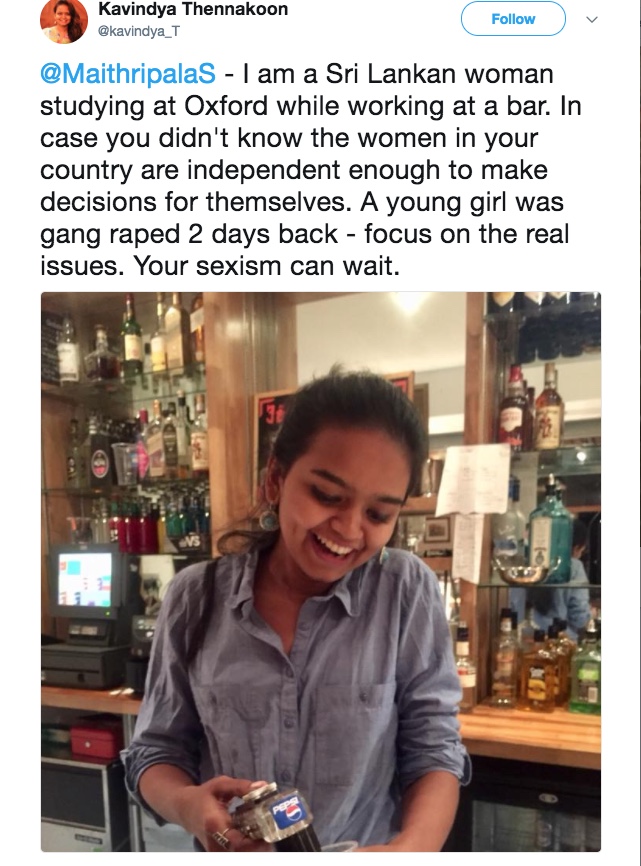A Brief Colonial History Of Ceylon(SriLanka)
Sri Lanka: One Island Two Nations
A Brief Colonial History Of Ceylon(SriLanka)
Sri Lanka: One Island Two Nations
(Full Story)
Search This Blog
Back to 500BC.
==========================
Thiranjala Weerasinghe sj.- One Island Two Nations
?????????????????????????????????????????????????Wednesday, January 17, 2018
The Sirisena Saga: On Yahapālana Misogyny

By Chamindra Weerawardhana –January 16, 2018

 The
National Human Rights Action Plan [hereafter referred to as ‘Action
Plan’] is one of the best developments that came out of the otherwise
jaundiced Sirisena–Wickremesinghe joint
government. A crucial component of the Action Plan was a call to work
towards repealing legislation of yesteryear that restrict fundamental
freedoms of Sri Lankan citizens.
The
National Human Rights Action Plan [hereafter referred to as ‘Action
Plan’] is one of the best developments that came out of the otherwise
jaundiced Sirisena–Wickremesinghe joint
government. A crucial component of the Action Plan was a call to work
towards repealing legislation of yesteryear that restrict fundamental
freedoms of Sri Lankan citizens.
Last week, Finance Minister Mangala Samaraweera MP announced a decision that
was part of the gradual implementation of the Action Plan – which
involved amending a law passed in the Dominion of Ceylon in 1955. This
extremely misogynist ‘law’ banned selling alcohol to women. It also
prohibited women from working in bars, distilleries and breweries.
Samaraweera’s directive was intended at rescinding this archaic dinosaur
of a law, which simply has no place in a country that is even
parsimoniously serious about gender equality.
What happened thereafter does not require any
reiteration here. The first and the trickiest of elections since the
2015 presidential and parliamentary elections is on the way, and
President Sirisena was quick to jump in the bandwagon of fundamentalist
and, in the book this writer has read, thoroughly uncultured
conservatism. He used presidential powers tooverturn the ministerial directive, reinstating the 1955 monstrosity of a law.
This decision can be interpreted as an effort by
Sirisena to reap electoral advantage among the non-urban, and to a very
large extent socially conservative vote base. It can also be understood
as a decision that helps cement Sirisena’s position as a politico from
the rural conservative hinterland, as opposed to the urban, cosmopolitan
and to follow the much-repeated cliché, ‘westernised’, types heading
the UNP.
It can also be argued that Samaraweera, being the
seasoned politician he is, ought to have waited until the end of the
local government poll to come up with this directive.
At another level, Samaraweera’s directive can also be
understood as precisely intended at appealing at a very specific vote
base that would be extremely decisive at the forthcoming elections – the
Colombo electorate. This time around, the UNP has fielded one of its
most progressive voices, Rosie Senanayake, as the Colombo mayoral
candidate. To the cosmopolitan Colombo electorate disillusioned by the
Joint Government’s many vices, a
directive of this nature would have meant that their 2015 vote was not
in vain. A decision with gender equality and fighting misogynist
prejudice at its core implemented by her party would have been
advantageous to Ms Senanayake.
Leaving political speculations aside, it goes without
saying that Sirisena’s reaction to this directive is extremely pathetic
and puerile. It is a move that relegates the President of the Democratic
Socialist Republic of Sri Lanka to the absolute laughing stock of the
world. This decision shows where Sirisena stands on the fundamental
rights and freedoms of women.
Reactions by many Sri Lankans on social media demonstrate the extent of the presidential decision’s unpopularity.

Source: Click here.
This decision may come as a shock to some,
but to this writer, a member of the LGBTQI+ community, it certainly does
not come as a surprise.



